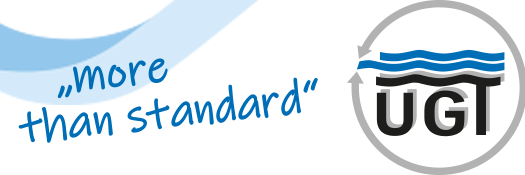In this time of social distancing, webinars are a great way to access helpful information and tools to make your job easier and improve project outcomes. Our partner In-Situ, one of the market leaders in water level sensors and multiparameter sondes, has put together a Spring Webinar Series rich with material to improve your knowledge about water quality measurement, water level and flow monitoring and low flow sampling. Please take a look, sign up today, and share with your peers.
https://in-situ.com/blog/2020-spring-webinar-series/
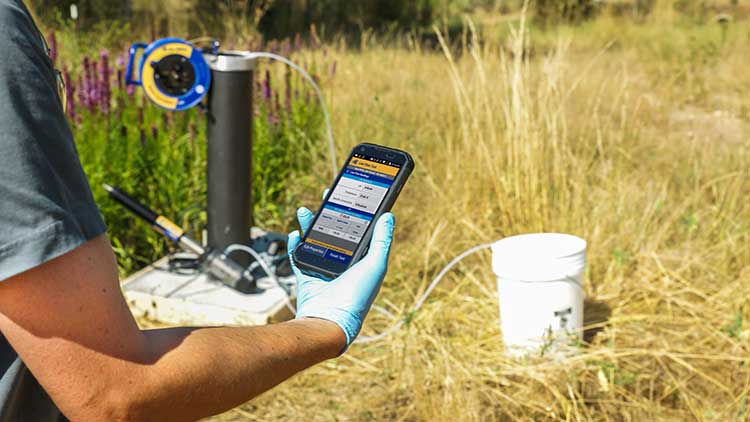
Expo 2020 Dubai and the German Pavilion
The next World Expo will take place from 20 October 2020 to 10 April 2021in Dubai, where the theme will be “Connecting Minds, Creating the Future”.
More than 190 countries will be participating in what will be the first Expo to be held in the Arabic-speaking region. The organisers are expecting over 70% of the visitors to come from overseas.
Koelnmesse GmbH will be organising and running the German Pavilion at Expo 2020 Dubai on behalf of the Federal Ministry for Economic Affairs and Energy. The “German Pavilion Expo 2020 Dubai Consortium”, comprising facts and fiction GmbH (Cologne) and NUSSLI Adunic AG (Hüttwilen, Switzerland), is in charge of concept design, planning and realisation. facts and fiction is responsible for content, exhibition and media design, and the pavilion is being built by NUSSLI Adunic.
UGT is a partner of the consortium and presents itself with its exhibit “Ecoworm” at the exhibition.
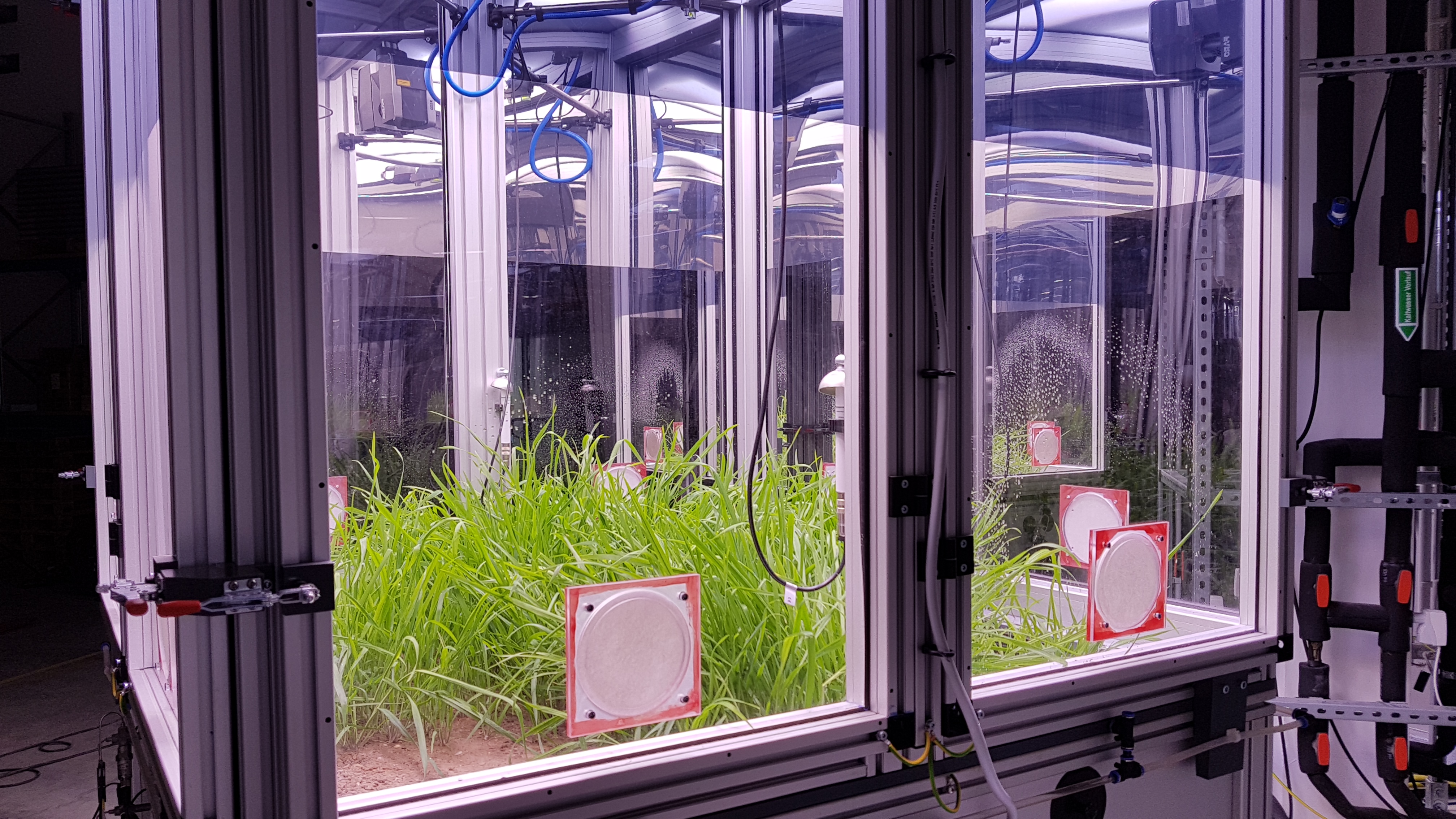
iDiv Ecotron with 24 EcoUnits at the UFZ research station Bad Lauchstädt
The architecture and spatial design come from LAVA – Laboratory for Visionary Architecture (Berlin). The cultural programme, known as Culture Lab, is being put together by Frankfurt-based agency VOSS+FISCHER, working in a consortium with culture and media manager Mike P. Heisel.
EcoUnit (Ecoworm) goes to Expo 2020
UGT is proud to be part of this magnificent event!
Expo 2020 Dubai takes place from 20 October 2020 to 10 April 2021. Over the course of 173 days, the world exhibition will present innovations, share ideas and foster collaboration between Nations to consider the challenges facing today’s world and the ways in which they could be solved. “The World’s greatest Show” presents itself in line with its overarching theme of “Connecting Minds, Creating the Future”.
In Dubai, the focus will be on three sub-themes of major significance for the world in which we live: opportunity, mobility and sustainability. They each present us with a difficult task but they also offer new perspectives on how we can change the way we live our lives.
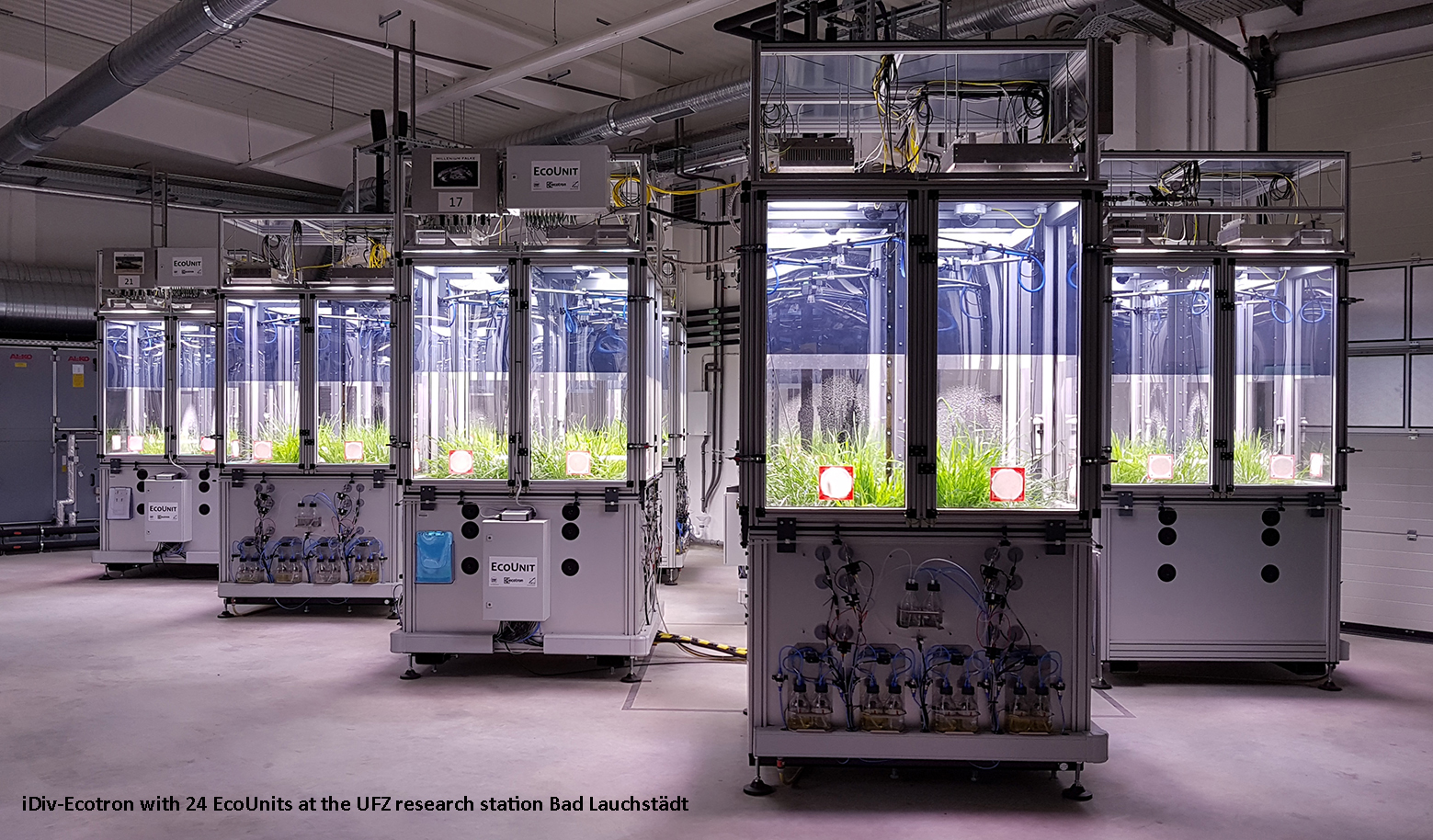
Expo 2020 will be the first world expo to be held in MENA region and is set to attract the highest ever number of visitors from abroad. The number of visits to Expo 2020 is expected to be as high as 25 million, with around 70% coming from outside the United Arab Emirates. More than 200 countries, international organisations and companies will be represented in Dubai – to ensure a better, sustainable future..
We will keep you in the loop for further details!
Contact our Customer Service via Skype "Livechat"
For the current occasion
Even if you work in the home office, the direct line to UGT remains – without disclosing private data.
Contact our Customer Service via Skype “Livechat”, via messenger, telephone or video chat.
http://www.ugt-online.de/home/
Postponed: Workshop Lysimeter – Sap Flow – IoT, Munich/Freising
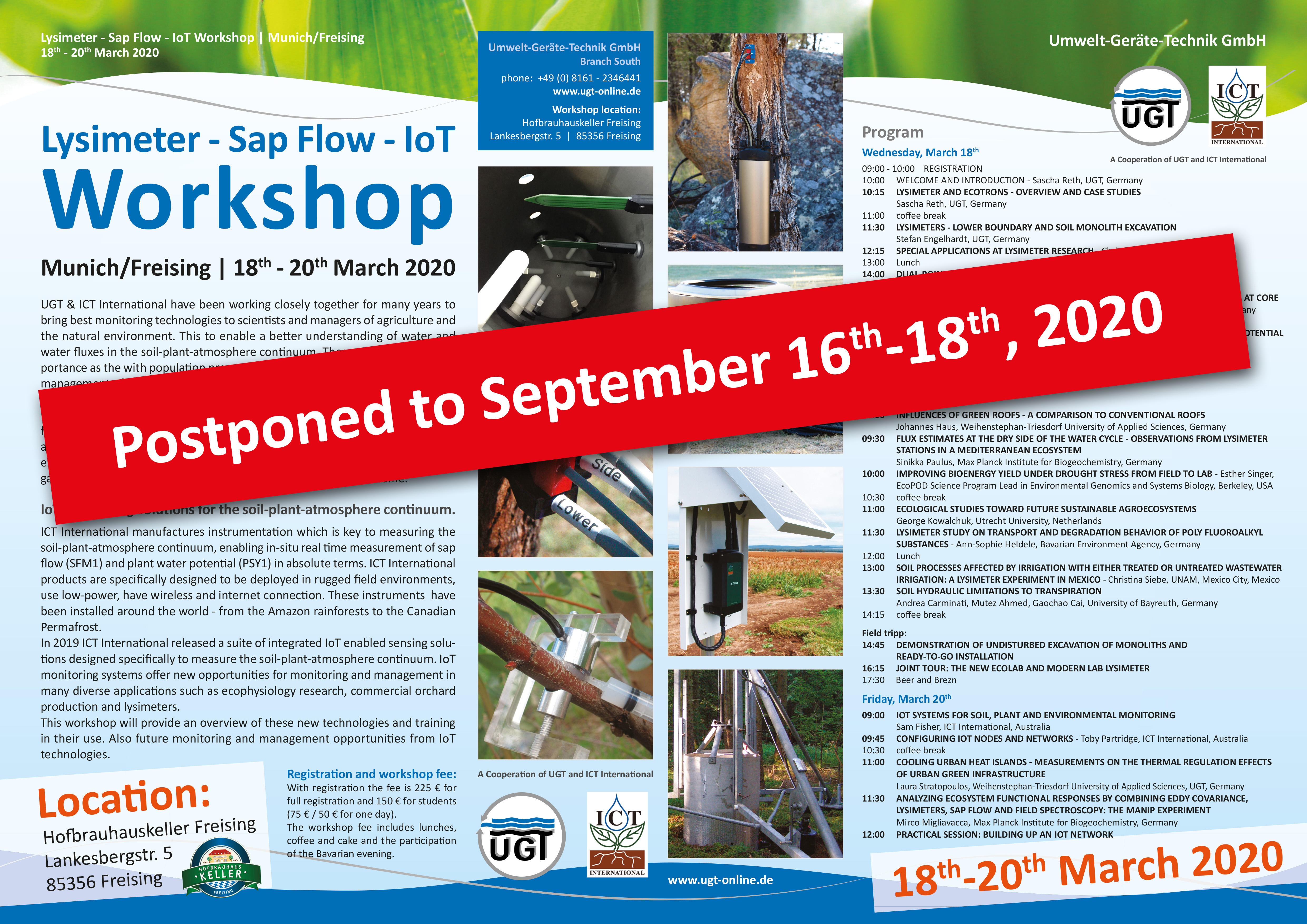
New publication in which UGT product SOIL-LT was involved: Effect of artificial soil compaction in landfill capping systems on anisotropy of air-permeability
Effect of artificial soil compaction in landfill capping systems on anisotropy of air-permeability
Steffen Beck-Broichsitter (1), Heiner Fleige (2), Horst H. Gerke (1), and Rainer Horn (2)
(1) Research Area 1 ‘‘Landscape Functioning’’, Working Group ‘‘Hydropedology’’, Leibniz Centre of Agricultural Landscape Research (ZALF),Germany
(2) Institute of Plant Nutrition and Soil Science, Kiel University, Germany
Abstract
Soil air permeability is an important parameter which governs the aeration in soils that significantly promotes the root growth of field and grassland species and leads, in turn, to higher levels of evapotranspiration. The German Landfill Directive (2009) requires a rigid or a minimal shrinking capping system that ensures a high evapotranspiration rate to decrease the infiltration rate through the underlying waste body and therefore the leachate generation. This research is focussed on the questions if compacted glacial till can ensure the required rigidity and if and how air permeability is affected by soil compaction.
The objective was to compare air-filled porosity and the direction-dependency of air permeability of a capping soil when assuming rigid and non-rigid conditions considering a shrinkage factor. Intact soil cores were sampled in vertical and horizontal direction in 0.05, 0.2, 0.5, and 0.8 m depths at two profiles of a mineral landfill capping system at the Rastorf landfill in Northern Germany. Desiccation experiments were carried out on differently-compacted soils and soil shrinkage was measured with a 3D laser triangulation device, while the air permeability was estimated with an air flow meter.
The results indicate that the ‘‘engineered’’ soil structure which was predominately platy due to a layered installation, led to a more anisotropic behaviour and therefore to higher air permeability in horizontal than in vertical direction. The compacted installation of the capping system seems to be effective and observes the statutory required more-or-less rigid system, otherwise, soil shrinkage would lead to vertical cracks and a more pronounced isotropic behaviour.
J. Plant Nutr. Soil Sci. 2020, 000, 1–11 DOI: 10.1002/jpln.201900281
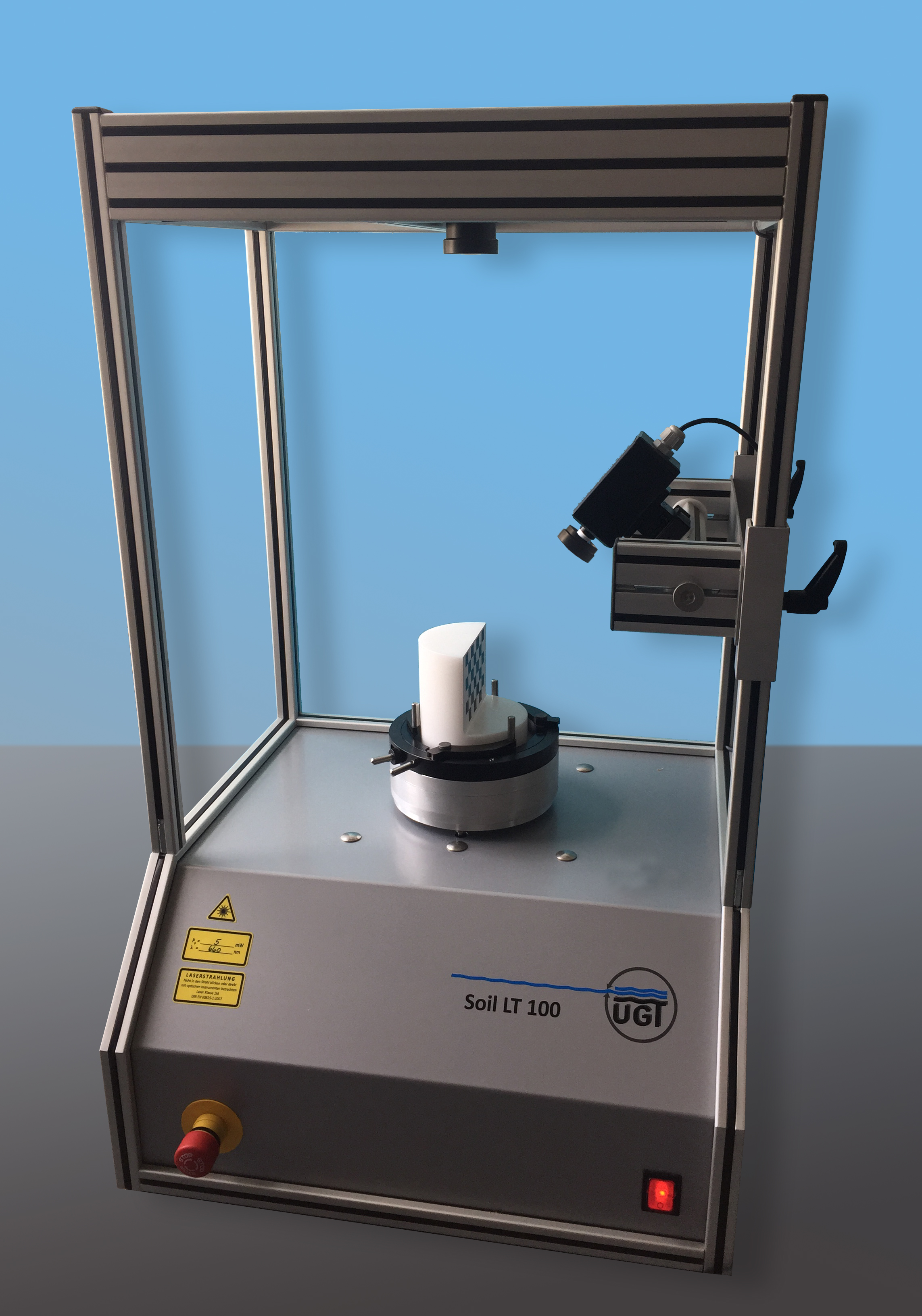
Update: Workshop Lysimeter – Sap Flow – IoT, Munich/Freising, 18th – 20th March 2020
Take the opportunity and register for the scientific and practical workshop with all about:
- weighable lysimeters
- ecotrons
- sap flow
- stem/leaf psychrometers
- IoT (LoraWAN)
The workshop location is at:
Hofbrauhauskeller Freising
Lankesbergstr. 5
85356 Freising
Registration and workshop fee:
With registration the fee is 225 € for full registration and 150 € for students (75 € / 50 € for one day).
The workshop fee includes lunches, coffee and cake and the participation of the Bavarian evening.
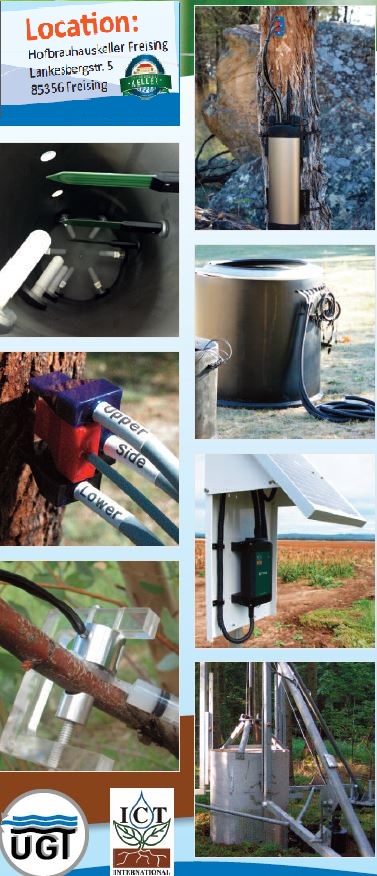
Program -UPDATE-
Wednesday, March 18th
09:00 – 10:00 REGISTRATION
10:00 WELCOME AND INTRODUCTION
Sascha Reth, UGT, Germany
10:15 LYSIMETERS AND ECOTRONS – OVERVIEW AND CASE STUDIES
Sascha Reth, UGT, Germany
11:00 COFFEE BREAK
11:30 LYSIMETERS – LOWER BOUNDARY AND SOIL MONOLOTH EXCAVATION
Stefan Engelhardt, UGT, Germany
12:15 SPECIAL APPLICATIONS AT LYSIMETER RESEARCH
Christian Heerdt, UGT, Germany
13:00 LUNCH
14:00 DUAL-POINT-DENDROMETER – TRACKING GROWTH, WATER STATUS, AND OSMOTIC PROCESSES IN TREES
Roman Zweifel, Zweifel Consulting, Switzerland
14:30 CONCEPT OF A COMBINED HYDROLOGICAL AND TREE PHYSIOLOGICAL MONITORING AT CORE LEVEL II PLOTS IN BAVARIA
Stephan Raspe, Bavarian State Institute of Forestry, Germany
15:00 COFFEE BREAK
15:30 APPLICATIONS IN MONITORING PLANT WATER STATUS USING SAP FLOW AND WATER POTENTIAL
Ben Umali, ICT International, Australia
16:15 INSTALLATION OF SAPFLOW AND PSYCHROMETER SENSORS
19:00 BARVARIAN EVENING
OPENING WITH BRASS ENSEMBLE, MUSIC SCHOOL FREISING
Thursday, March 19th
09:00 INFUENCES OF GREEN ROOFS – A COMPARISON TO CONVENTIONAL ROOFS
Johannes Haus, Weihenstephan-Triesdorf University of Applied Sciences, Germany
9:30 FLUX ESTIMATES AT THE DRY SIDE OF THE WATER CYCLE – OBSERVATIONS FROM LYSIMETER STATIONS IN A MEDITERRANEAN ECOSYSTEM
Sinikka Paulus, Max Planck Institute for Biogeochemistry, Germany
10:00 IMPROVING BIOENERGY YIELD UNDER DROUGHT STRESS FROM FIELD TO LAB
Esther Singer, EcoPOD Science Program Lead in Environmental Genomics and Systems Biology, Berkeley, USA
10:30 COFFEE BREAK
11:00 ECOLOGICAL STUDIES TOWARD FUTURE SUSTAINABLE AGROECOSYSTEMS
George Kowalchuk, Utrecht University, Netherlands
11:30 LYSIMETER STUDY ON TRANSPORT AND DEGRADATION BEHAVIOR OF POLYFLUOROALKYLSUBSTANCES
Ann-Sophie Heldele, Bavarian Environment Agency, Germany
12:00 LUNCH
13:00 SOIL PROCESSES AFFECTED BY IRRIGATION WITH EITHER TREATED OR UNTREATED WASTEWATER IRRIGATION: A LYSIMETER EXPERIMENT IN MEXICO
Christina Siebe, UNAM, Mexico City, Mexico
13:30 Soil HYDRAULIC LIMITATIONS TO TRANSPIRATION
Andrea Carminati, Mutez Ahmed, Gaochao Cai, University of Bayreuth, Germany
14:15 COFFEE BREAK
Field tripp (outdoor shoes required):
14:45 DEMONSTRATION OF UNDISTURBED EXCAVATION OF MONOLITHS AND
READY-TO-GO INSTALLATION
16:15 JOINT TOUR: THE NEW ECOLAB AND MODERN LAB LYSIMETER
17:30 BEER & BREZN
Friday, March 20th
9:00 IoT SYSTEMS FOR SOIL, PLANT AND ENVIRONMENTAL MONITORING
Sam Fisher, ICT International, Australia
9:45 CONFIGURING IoT NODES AND NETWORKS
Toby Partridge, ICT International, Australia
10:30 COFFEE BREAK
11:00 COOLING URBAN HEAT ISLANDS – MEASUREMENTS ON THE THERMAL REGULATION EFFECTS OF URBAN GREEN INFRASTRUCTURE
Laura Stratopoulos, Weihenstephan-Triesdorf University of Applied Sciences, UGT, Germany
11:30 ANALYZING ECOSYSTEM FUNCTIONAL RESPONSES BY COMBINING EDDY COVARIANCE, LYSIMETERS, SAP FLOW AND FIELD SPECTROSCOPY: THE MANIP EXPERIMENT
Mirco Migliavacca, Max Planck Institute for Biogeochemistry, Germany
12:00 PRACTICAL SESSION: BUILDING UP AN IoT NETWORK
 Lysimeter-SapFlow_WS 18-20March2020_program
Lysimeter-SapFlow_WS 18-20March2020_program
2nd Announcement: Workshop Lysimeter – Sap Flow – IoT, Munich/Freising, 18th – 20th March 2020
Registration and workshop fee:
With registration the fee is 225 € for full registration and 150 € for students (75 € / 50 € for one day).
The workshop fee includes lunches, coffee and cake and the participation of the Bavarian evening.
Program
Wednesday, March 18th
09:00 – 10:00 REGISTRATION
10:00 WELCOME AND INTRODUCTION
Sascha Reth, UGT, Germany
10:15 Lysimeter and Ecotrons – Overview and case studies
Sascha Reth, UGT, Germany
11:00 coffee break
11:30 Lysimeters – Lower Boundary and soil monolith excavation
Stefan Engelhardt, UGT, Germany
12:15 Special applications at lysimeter research
Christian Heerdt, UGT, Germany
13:00 Lunch
14:00 Dual-point-dendrometer – tracking growth, water status, and osmotic processes in trees
Roman Zweifel, Zweifel Consulting, Switzerland
14:45 DEMONSTRATION OF UNDISTURBED EXCAVATION OF MONOLITHS
and READY-TO-GO INSTALLATION
16:30 JOINT TOUR: THE NEW ECOLAB and MODERN LAB LYSIMETER
17:30 Group discussion
20:00 Bavarian Evening
Thursday, March 19th
09:00 Influences of green roofs – a comparison to conventional roofs
Johannes Haus, Weihenstephan-Triesdorf University of Applied Sciences, Germany
9:30 Flux estimates at the dry side of the water cycle – observations from lysimeter
stations in a Mediterranean ecosystem
Sinikka Paulus, Max Planck Institute for Biogeochemistry, Germany
10:00 Improving bioenergy yield under drought stress from field to lab
Esther Singer, EcoPOD Science Program Lead in Environmental Genomics and Systems Biology, Berkeley, USA
10:30 coffee break
11:00 Ecological studies toward future sustainable agroecosystems
George Kowalchuk, Utrecht University, Netherlands
11:30 Lysimeter study on transport and degradation behavior of polyfluoroalkyl substances
Ann-Sophie Heldele, Bavarian Environment Agency, Germany
12:00 Lunch
13:00 Soil processes affected by irrigation with either treated or untreated wastewater irrigation: a lysimeter experiment in Mexico
Christina Siebe, UNAM, Mexico City, Mexico
13:30 The right lysimeter for the special need
Sascha Reth, UGT, Germany
14:00 Concept of a Combined Hydrological and Tree Physiological Monitoring at Core Level II Plots
in Bavaria
Stephan Raspe, Bavarian State Institute of Forestry, Germany
14:30 coffee break
15:00 Applications in monitoring plant water status using sap flow and water potential
Ben Umali, ICT International, Australia
15:45 Soil hydraulic limitations to transpiration
Andrea Carminati, Mutez Ahmed, Gaochao Cai, University of Bayreuth, Germany
16:30 Installation of sapflow and psychrometer sensors
Friday, March 20th
9:00 IoT systems for Soil, Plant and Environmental Monitoring
Sam Fisher, ICT International, Australia
9:45 Configuring IoT Nodes and Networks
William Bruce, ICT International, Australia
10:30 coffee break
11:00 Cooling urban heat islands – measurements on the thermal regulation effects of urban green infrastructure
Laura Stratopoulos, Weihenstephan-Triesdorf University of Applied Sciences, UGT, Germany
11:30 Analyzing ecosystem functional responses by combining eddy covariance, lysimeters, sap flow and field spectroscopy: the MANIP experiment
Mirco Migliavacca, Max Planck Institute for Biogeochemistry, Germany
12:00 Practical session: building up an IoT network
![]() download the poster: Lysimeter-SapFlow_WS 18-20March2020_program
download the poster: Lysimeter-SapFlow_WS 18-20March2020_program
UGT & ICT International have been working closely together for many years to
bring best monitoring technologies to scientists and managers of agriculture and
the natural environment. This to enable a better understanding of water and
water fluxes in the soil-plant-atmosphere continuum. These topics grows in importance
as the with population pressure and climate change understanding and
management of water becomes ever more critical.
Lysimeters are a proven tool for ecosystem studies. They are the reference system
for matter and energy fluxes in rather undisturbed systems. Big enough to provide
a root space for representative plant stands, they measure precise and detailed
enough to describe fluxes at high resolution. Pesticide leaching, and greenhouse
gas emissions can be quantified for the well defined lysimeter volume.
IoT Monitoring Solutions for the soil-plant-atmosphere continuum.
ICT International manufactures instrumentation which is key to measuring the
soil-plant-atmosphere continuum, enabling in-situ real time measurement of sap
flow (SFM1) and plant water potential (PSY1) in absolute terms. ICT International
products are specifically designed to be deployed in rugged field environments,
use low-power, have wireless and internet connection. These instruments have
been installed around the world – from the Amazon rainforests to the Canadian
Permafrost.
In 2019 ICT International released a suite of integrated IoT enabled sensing solutions
designed specifically to measure the soil-plant-atmosphere continuum. IoT
monitoring systems offer new opportunities for monitoring and management in
many diverse applications such as ecophysiology research, commercial orchard
production and lysimeters.
This workshop will provide an overview of these new technologies and training
in their use. Also future monitoring and management opportunities from IoT
technologies.
Announcement: International Lysimeter – Sap Flow – IoT Workshop in Munich/Freising, 18th – 20thMarch 2020
UGT & ICT International have been working closely together for many years to bring best monitoring technologies to scientists and managers of agriculture and the natural environment. This to enable a better understanding of water and water fluxes in the soil-plant-atmosphere continuum. These topics grows in importance as the with population pressure and climate change understanding and management of water becomes ever more critical.
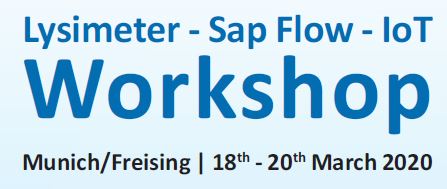
Lysimeters are a proven tool for ecosystem studies. They are the reference system for matter and energy fluxes in rather undisturbed systems. Big enough to provide a root space for representative plant stands, they measure precise and detailed enough to describe fluxes at high resolution. Pesticide leaching, and greenhouse gas emissions can be quantified for the well defined lysimeter volume.
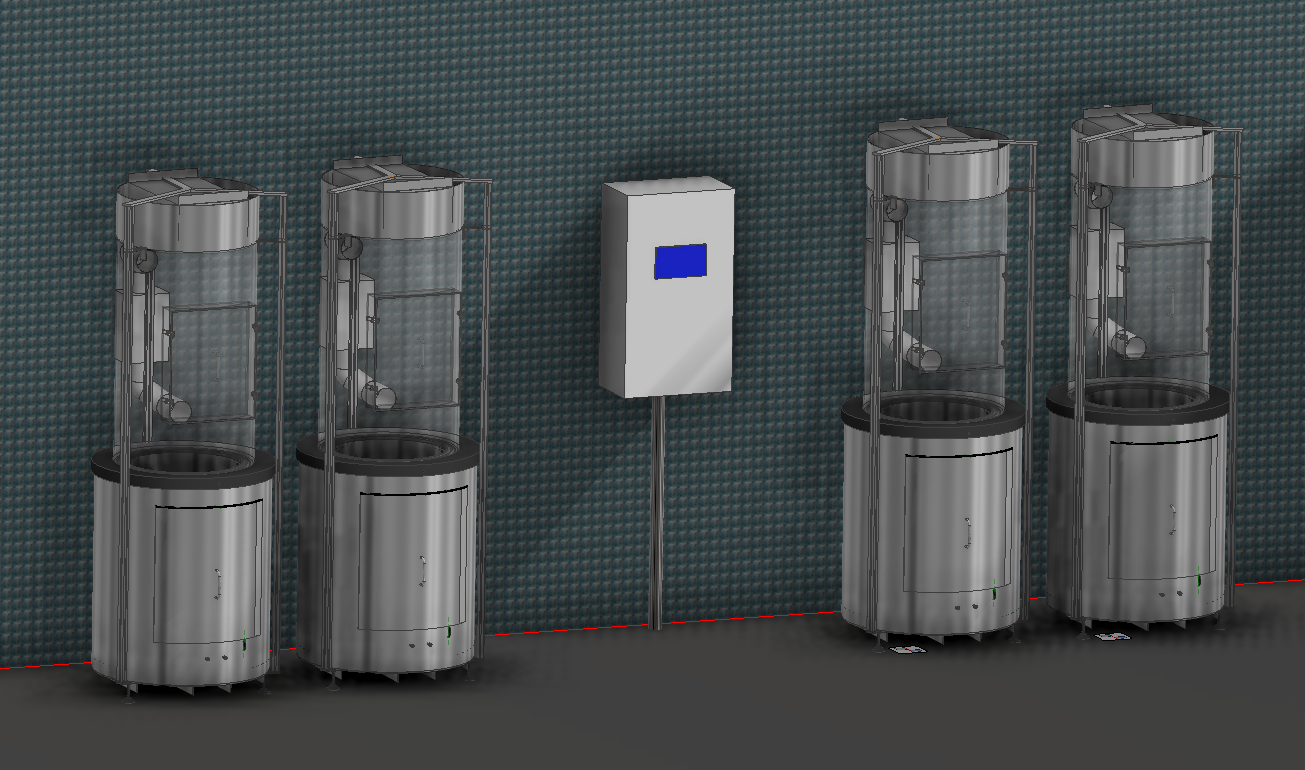
EcoLab
IoT Monitoring Solutions for the soil-plant-atmosphere continuum.
ICT International manufactures instrumentation which is key to measuring the soil-plant-atmosphere continuum, enabling in-situ real time measurement of sap flow (SFM1) and plant water potential (PSY1) in absolute terms.

ICT International products are specifically designed to be deployed in rugged field environments, use low-power, have wireless and internet connection. These instruments have been installed around the world – from the Amazon rainforests to the Canadian Permafrost.
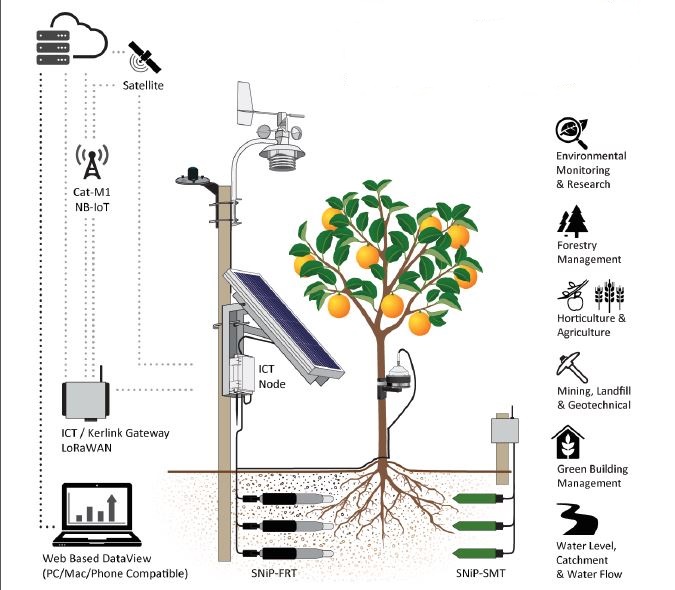
In 2019 ICT International released a suite of integrated IoT enabled sensing solutions
designed specifically to measure the soil-plant-atmosphere continuum. IoT monitoring systems offer new opportunities for monitoring and management in many diverse applications such as ecophysiology research, commercial orchard production and lysimeters.
This workshop will provide an overview of these new technologies and training in their use. Also future monitoring and management opportunities from IoT technologies.
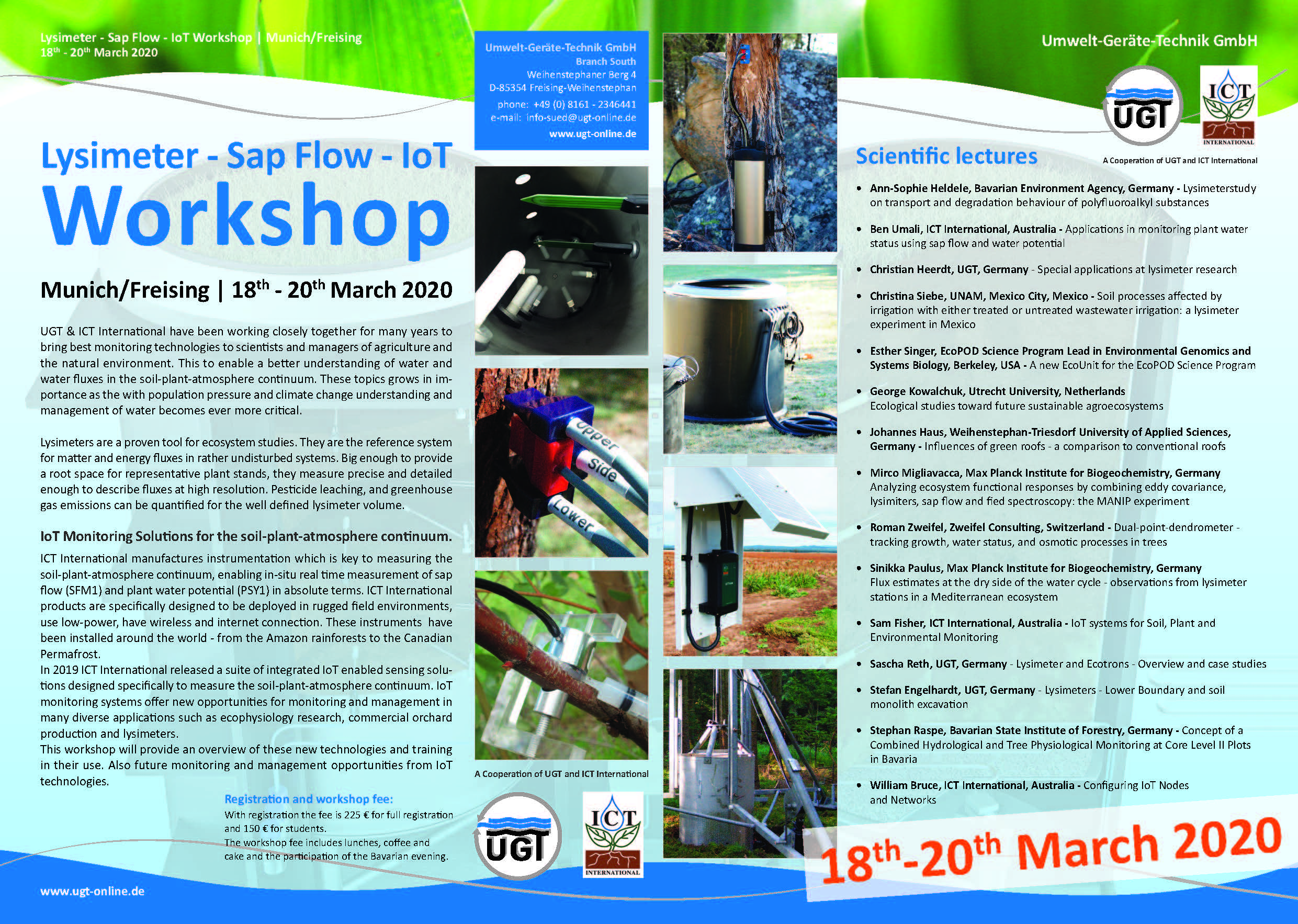
Registration and workshop fee:
With registration the fee is 225 € for full registration and 150 € for students.
The workshop fee includes lunches, coffee and cake and the participation of the Bavarian evening.
[contact-form to=”info-sued@ugt-online.de” subject=”Registration for lysimeter, sapflow & IoT workshop”][contact-field label=”Name” type=”name” required=”1″ /][contact-field label=”Institute and address” type=”text” required=”1″ /][contact-field label=”Full registration/student” type=”radio” options=”full registration,student” required=”1″ /][contact-field label=”Email” type=”email” required=”1″ /][contact-field label=”Comment” type=”text” /][/contact-form]
Lysimeter to improve desert soils
UGT feels happy to have been chosen by the Hamad Bin Khalifa University (HBKU) in Doha to provide and install a lysimeter station with three RTG Lysimeter.
Sustainability a key for future…
The research of the international team of scientist who work with the lysimeter will focus on the melioration of sandy soils with biochar to improve the fertility of poor soils in desert regions and manage water supply optimal in dry regions.
Easy data management a key for efficient work
The SVADSS data service from UGT enables the user to get their newest data every morning right on their desk. Automaticly created graphs gives you a quick inside of your monitoring station and you have always good overview on what´s going on in the field. Focus on science instead of digging for data.
Sensible sensors – sensible working
The site was chosen on a green area of Education City in Doha. As UGT feels proud to provide best solutions with minimal impact on the study site we removed the green from the construction site first and stored it aside.
The three RTG Lysimeter could be installed carefully and after all the green was replaced and the site was immedeately in perferct shape again.
We claim nothing else than the best according our ambitious philosophy…UGT – more than standard!
Smile and sweat…
Our senior consultant for Lysimeter & Ecotrons Stefan Engelhardt, couldn´t be stopped by 40°C without shadow. His experience of about 250 installed lysimeter around the globe fits him for such challenges.
The next lysimeter for the region will follow in few weeks.
Thanks for trusting UGT!
